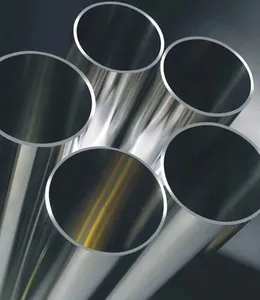Home > Blog > The application advantages of sanitary grade stainless steel pipes in the pharmaceutical and medical
-
 Laijing Bu
Hi there! Welcome to my shop. Let me know if you have any questions.
Laijing Bu
Hi there! Welcome to my shop. Let me know if you have any questions.
Your message has exceeded the limit.

The application advantages of sanitary grade stainless steel pipes in the pharmaceutical and medical
2025-07-15 09:27:12
The application advantages of sanitary grade stainless steel pipes in the pharmaceutical and medical industries mainly stem from their customized design for high hygiene standards, pollution prevention, corrosion resistance, and other needs in the industry. The following analysis will be conducted from the dimensions of material properties, surface treatment, compliance, and performance:
1、 Material characteristics: high purity and corrosion resistance, suitable for harsh media
1. Targeted selection of materials
Commonly used ultra-low carbon stainless steels such as 316L and 304L, with a carbon content of ≤ 0.03%, reduce the risk of intergranular corrosion (chloride ions or acid-base media in the solution can easily cause corrosion of ordinary stainless steels).
316L, due to the addition of molybdenum (Mo), has stronger resistance to chloride ion corrosion and is suitable for transporting drugs or disinfectants containing sodium chloride (such as sodium hypochlorite solution).
2. Resistance to medium corrosion and chemical reactions
In the pharmaceutical process, commonly used strong acids (such as hydrochloric acid), strong bases (such as sodium hydroxide) cleaning solutions, or high-temperature steam sterilization scenarios, sanitary grade stainless steel pipes can maintain surface integrity and avoid metal ion leaching and contamination of the drug solution (such as Fe ³ ⁺, which can affect drug stability).
In the transportation of medical gases (such as oxygen and laughing gas) in the medical industry, the pipes will not contaminate the gas due to oxidation and rust, ensuring the purity of the gas inhaled by patients.
2、 Surface treatment: Low roughness and no dead corners design block pollution paths
1. Clean advantages of electrolytic polishing (EP)
Surface roughness Ra ≤ 0.8 μ m (even up to 0.2 μ m), compared to ordinary stainless steel (Ra ≥ 1.6 μ m), reduces the residue of liquid medicine, purified water and other media on the pipe wall, and lowers the probability of bacterial biofilm formation (biofilm is the main hidden danger of microbial contamination in the pharmaceutical industry).
Case: In the vaccine production line, the pipeline processed by EP can avoid residual adhesion of vaccine components and ensure consistency of each batch of products.
2. Aseptic welding and structural design
Adopting automatic track welding technology, the weld seam is smooth and free of weld beads, avoiding the accumulation of dirt in the gaps of traditional manual welding; The pipeline connection adopts clamp type (quick installation joint), which is easy to disassemble and has no dead corners on the sealing surface, making it convenient for online cleaning (CIP) and online sterilization (SIP).
Medical scenario application: The purified water pipeline in hospital clean operating rooms is designed with smooth inner walls and no dead corners to prevent postoperative infection risks.
3、 Compliance certification: meets the highest hygiene standards in the industry
1. Mandatory adaptation of international and domestic standards
Compliant with GMP (Good Manufacturing Practice), FDA (Food and Drug Administration), ISO 13485 (Medical Device Quality Management System) and other certification requirements, such as:
The FDA specifies that 316L stainless steel must be used for pipes that come into direct contact with drugs, and surface treatment must pass biocompatibility tests (such as cytotoxicity and allergenicity tests).
Domestic pharmaceutical companies' injection production lines must use sanitary grade pipelines, otherwise they cannot pass GMP certification.
2. Traceability and verification support
The production process of pipes requires documentation such as material certification, surface treatment parameters, and welding process validation to facilitate process validation by pharmaceutical companies (such as cleaning validation and sterilization validation) and meet industry "traceability" requirements.
4、 Performance advantage: Adapt to the full process requirements of pharmaceutical technology
1. Sterilization resistance and long-term stability
Can withstand high temperature steam sterilization (121 ℃, 30 minutes), ozone sterilization, or chemical reagent (such as hydrogen peroxide) disinfection, without producing oxide skin or corrosion spots on the surface, avoiding the introduction of impurities during the sterilization process.
Data from a certain cephalosporin antibiotic production enterprise shows that the purified water system using sanitary grade stainless steel pipes has been running continuously for 5 years without any inner wall corrosion, and the microbiological test results are always<10CFU/100ml.
2. Low particle release and cleanliness maintenance
In medical gas pipelines in clean rooms (such as Class 100 clean areas), sanitary grade stainless steel pipes have a low surface particle detachment rate (such as less than 100 particles per square meter per 0.5 μ m) to avoid particle contamination of the surgical environment or medical equipment.
5、 Maintenance and Cost: Significant Long term Economic Benefits
1. Cleaning efficiency and reduced maintenance costs
The smooth surface improves the efficiency of online cleaning (CIP), for example, in the oral liquid production line of a large pharmaceutical company, after using sanitary grade pipes, the cleaning time was shortened from 4 hours to 2 hours, and the amount of detergent used was reduced by 30%.
2. Extended service life and reduced replacement costs
Compared to ordinary stainless steel pipes (with a replacement cycle of 5-8 years), sanitary grade stainless steel pipes can be used for more than 15 years with proper maintenance, especially in pharmaceutical scenarios with frequent sterilization, reducing downtime and maintenance losses caused by pipeline corrosion.
6、 Typical application scenarios and implementation cases of advantages
Picture 1
summarize
The core advantage of sanitary grade stainless steel pipes in the pharmaceutical and medical industries lies in the integration of "materials, processes, and standards": high-purity materials solve corrosion and pollution problems, high-precision surface treatment blocks microbial growth paths, and strict compliance meets industry regulatory requirements. These characteristics make it a key infrastructure for ensuring hygiene, safety, and process stability throughout the entire chain from drug production to clinical healthcare.
Tags: High purity and corrosion resistance suitable for harsh media, Low roughness and no dead corners design block pollution paths, Adapt to the full process requirements of pharmaceutical technology


